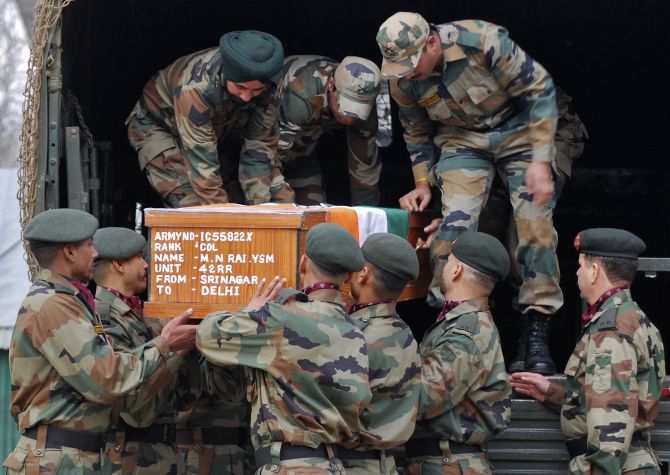'All commanding officers and their superiors are sure to have taken note of the betrayal that killed Colonel Rai. Corrective measures will be taken quickly. And the Indian Army will continue to do its duty without rancour and remorse,' says Nitin A Gokhale.
 The martyrdom of Colonel M N Rai, who died in Kashmir in terrorist firing, has once again opened the old debate on how the Indian Army should conduct its counter-insurgency, counter-terrorist operations under the changed circumstances in the border state.
The martyrdom of Colonel M N Rai, who died in Kashmir in terrorist firing, has once again opened the old debate on how the Indian Army should conduct its counter-insurgency, counter-terrorist operations under the changed circumstances in the border state.
Colonel Rai, a highly effective commanding officer, heading the 42 Rashtriya Rifles battalion, was killed in indiscriminate firing by two terrorists holed up inside a house in a village near Tral in South Kashmir even as he held back launching an operation after villagers requested him to wait for them to surrender.
Friends and relatives of the two local youth, who were hardcore members of a terrorist outfit, told Colonel Rai that they would prevail on the two men to surrender after the CO reached the village with his Quick Reaction Team following an intelligence tip off.
Even as he held back, the well-armed terrorists came out firing indiscriminately, killing Colonel Rai and a brave policeman, Head Constable Sanjiv Singh on the spot.
Colonel Rai's approach, part of an Indian Army doctrine based on WHAM -- Winning Hearts And Minds -- was correct under the circumstances that have prevailed in Jammu and Kashmir for at least a couple of years.
After nearly a quarter century of intense Counter Intelligence-Counter Terrorism ops bordering on outright war, the Army has seen the tempo tapering off a bit in the past few years, at least in the hinterland.
The 25-year long conflict is in fact going through a stabilisation phase that requires a combination of force and tact in dealing with terrorists taking shelter in populated areas. The handling becomes all the more difficult if the encounter involves local terrorists.
Colonel Rai's colleagues, his subordinates and some veterans say he did exactly what any CO of the Indian Army has done for years in Kashmir: Deal with terrorists/militants in a humane manner.
So when the villagers requested Colonel Rai to wait until they persuaded the two terrorists to surrender, he readily acceded. Little did Colonel Rai know that his trust would be betrayed.
Increasingly, Rashtriya Rifles battalions deployed in large numbers in Kashmir's interiors are faced with this dilemma. On the one hand, there is a need to reduce the Army's footprint and the earlier overwhelming, in-your face presence, and on the other not weaken the CI-CT grid that allows area domination.
Caught between these two opposite requirements, COs and company commanders, often young men with less than five years service, find it hard to strike a balance.
In coming months and years, this dilemma will only become more acute posing a serious challenge to the Army's endless 'No War, No Peace,' existence in Kashmir.
All COs and their superiors are sure to have taken note of the betrayal that killed Colonel Rai. Corrective measures will be taken quickly. And the Indian Army will continue to do its duty without rancour and remorse.
That is what makes the Indian soldier unique.
Nitin A Gokhale is one of India's best known experts on military affairs.
Image: Soldiers carry Colonel M N Rai's coffin. The colonel was killed in a gun battle with terrorists in Kashmir. Photograph: Reuters










